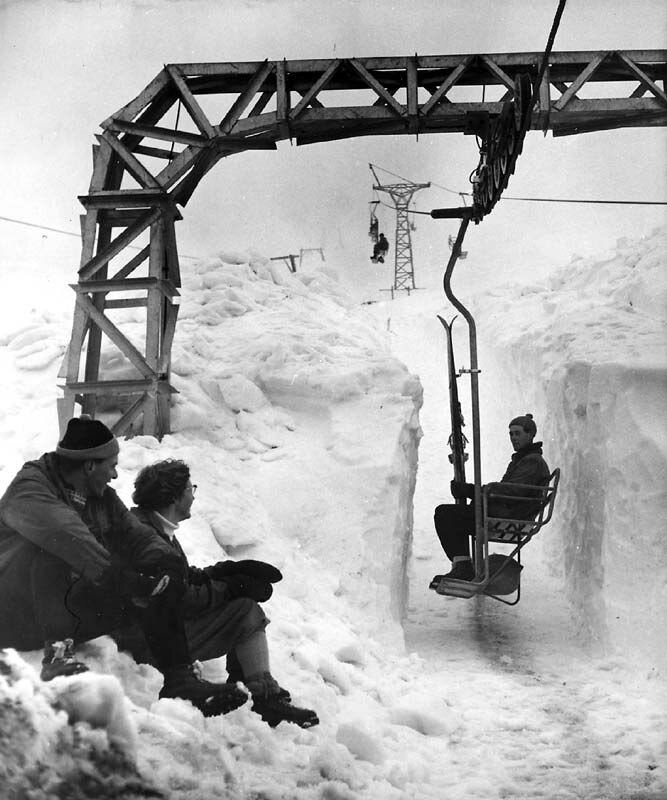The First Chairlift

In honor of the annual Snowsport History Celebration, and the U.S. Ski and Snowboard Hall of Fame Induction, we are dedicating March to telling some of our favorite ski history stories, and sharing profiles of inductees past and present.
This week, one of our favorite milestones in ski history - the creation of the very first chairlift.
Below is an excerpt from the nomination of James Curran, the inventor of that first single chair, which was built in 1936 as an effort by the Union Pacific Railroad to develop Sun Valley, Idaho into a winter resort destination.
Information submitted in a nomination letter to the U.S. National Ski Hall of Fame by Mary Purdy Gmuender.
Recently, a tramway engineer who reviewed Jim Curran’s notes and drawings for chairlifts found that the calculation for rope tensions, rope sags, driving torques and horsepower that Curran used in 1936 are virtually the same methods used today. Even the factor of safety that he chose for the haul rope would meet modern standards.
James Michael Curran was born as the sixth of seven children of Irish immigrant parents in Omaha, Nebraska. His father was sheriff of Doge County, Nebraska and his grandfather was an engineer in Ireland. After graduating from High school, Curran worked for Omaha’s Paxton and Vierling Ironworks as an ironworker and then as a draftsman. While working there, he attended night school and was one of the few engineers to pass the state examination for licensing as a professional engineer with no formal college training. As any engineer will tell you, this is no small feat. One of the jobs he worked on was designing an aerial conveyor system for hauling and loading a continuous flow of bananas from the loading docks of United Fruit to the fruit-boat holds in Honduras.
Curran started working as a draftsman for Union Pacific Railroad in Omaha, Nebraska in 1927. At that time, Averell Harriman, President of UPRR was creating the first destination ski resort in America, Sun Valley. Charley Proctor was working on laying out the runs and lift locations at Sun Valley as one of the first “ski area consultants.” At 33 years of age, now promoted to bridge engineer, Curran was in the engineering office when a telegram came from Harriman. In part the telegram read:
“IT IS ESSENTIAL IN CONNECTION WITH KETCHUM ENTERPRISE TO DEVELOP A METHOD OF LIFTING SKIERS TWO THOUSAND FEET ABOVE THE VALLEY FLOOR TO MOUNTAINS EAST OF TRAIL CREEK STOP* PROCTOR KNOWS POINT WHICH IS DESIRED TO BE REACHED STOP* THERE HAVE BEEN A NUMBER OF WAYS THIS PROBLEM HAS BEEN APPROACHED IN OTHER PLACES FROM HOISTS PULLING UP SLEDS TO AERIAL TRAMWAYS STOP* SUGGEST YOU HAVE ONE OF YOUR ENGINEERS DISCUSS THE PROBLEM WITH PROCTOR AND EXAMINE TERRAIN WITH A VIEW OF MAKING A RECOMMENDATION HOW THE PROBLEM CAN BE SOLVED IN THE MOST ECONOMIC MANNER STOP* OUR APPROACH SHOULD BE TO DEVELOP AS INEXPENSIVE A METHOD AS POSIBLE WITH A CAPACITY OF SAY ONE HUNDRED PEOPLE AN HOUR.”
Jim Curran recalled the banana conveyor system he had designed in Honduras when he worked for Paxton and Vierling Ironworks. He saw the basics of hauling bananas similar to hauling humans and Curran had used a rough sketch to suggest to the senior engineering review team a mono-cable, fixed-grip chairlift for the 1936 opening of Sun Valley. During this meeting, Curran’s immediate supervisors promptly rejected the idea as “too hazardous.” Luckily for all of us skiers, Charley Proctor is credited with saving the concept. He stopped at the UPRR offices in Omaha on his way to Sun Valley to check on the progress of the transportation project. Curran’s boss, Glen Trout called the engineering office and told them to “bring everything you have” so Proctor could review the proposals.
Curran had not let go of the banana-lift and took a chance. On his way to Trout’s office with the stack of proposals, he slipped he previously rejected sketch of the banana-lift concept in with the others. At Trout’s office, Trout was slowly flipping through the designs with Proctor looking on. When he got to the banana-lift sketch, Proctor was intrigued with Curran’s unique concept and chose it over the others, notifying Harriman that the UPRR engineers had come up with an extraordinary idea. It was called the “mono-cable.” Harriman’s ski expert friends, including John E. P. Morgan, more seriously analyzed the design and Harriman wanted it developed.
Thanks to Jim Curran’s innate abilities, inherently knowing how to apply science and math to solve problems without a college degree, he had revolutionized the sport of skiing. He invented the first chairlift by applying industrial technology to recreation. Hundreds of millions of skiers have enjoyed chairlifts throughout the world, invented first in America by a young, non-skiing, night school educated, Nebraska engineer…whose name nobody recognizes.
James Michael Curran was elected to the U.S. National Ski Hall of Fame in 2001.


